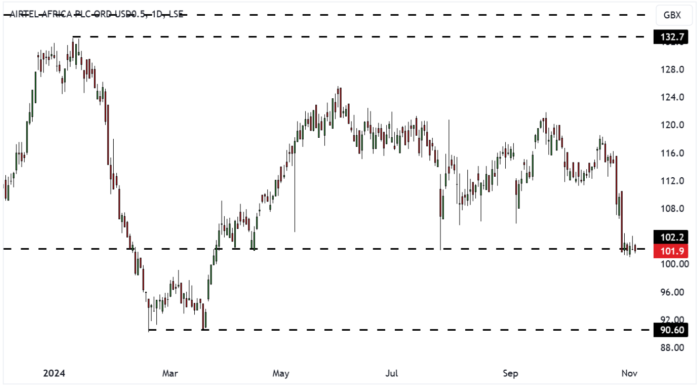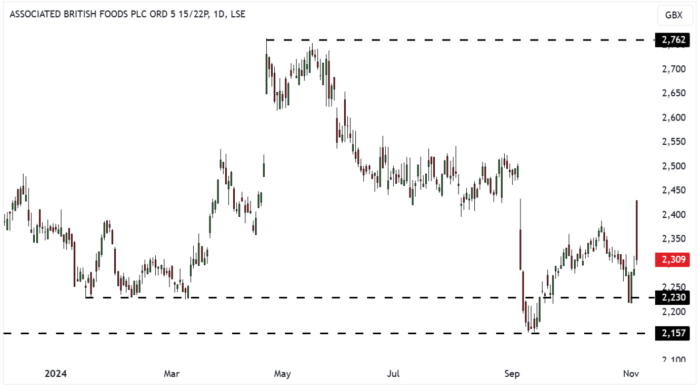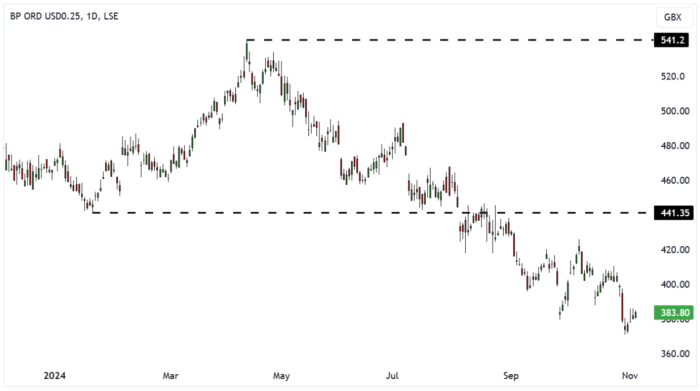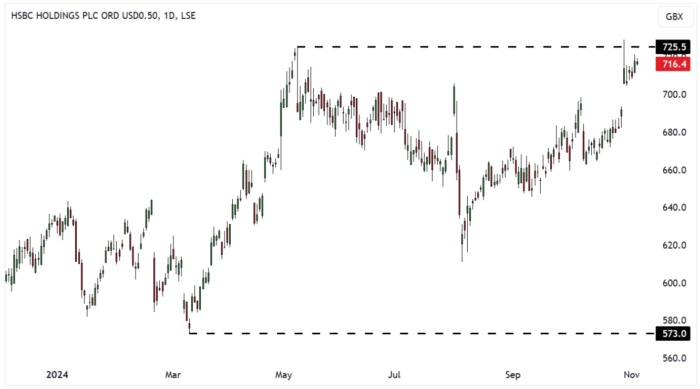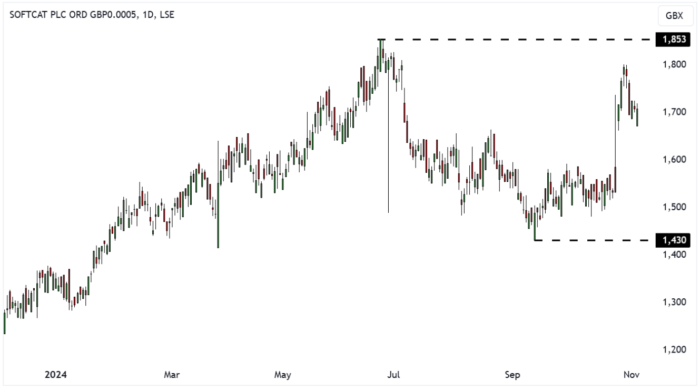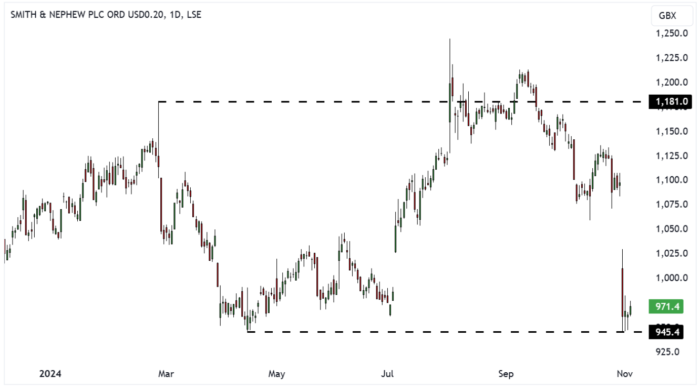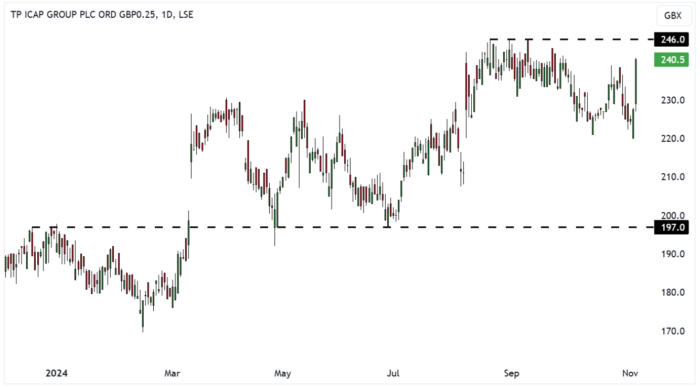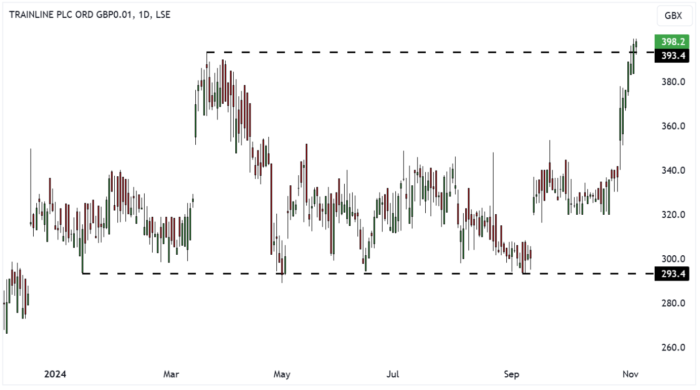6th Nov 2024. 9.00am

Regency View:
Update:

Regency View:
Update:
Airtel Africa: Investors react cautiously to half-year results
Airtel Africa’s (AAF) half-year results for the period ending September 30, 2024, prompted a cautious reaction from the market, despite reporting a revenue increase of 11.8% to $1.5 billion.
Mobile services growth reached 12.5%, contributing significantly to this revenue increase. However, net income dropped by 3% year-on-year to $212 million, raising concerns over profitability amid competitive pressures and regulatory challenges, particularly in Nigeria, which remains a critical market for the company.
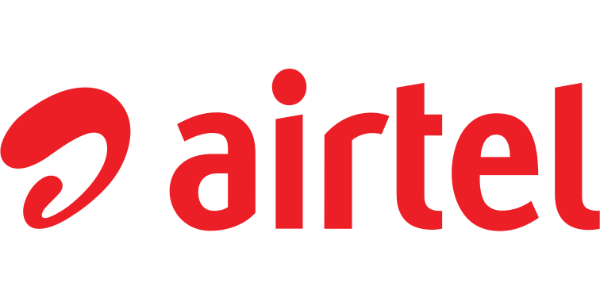
The company’s focus on mobile money services continues to yield results, with transaction volumes soaring by 32% to $800 million. However, rising operational costs and increased competition in data services have contributed to a mixed sentiment among investors, who are wary about the sustainability of growth in such a volatile environment.
Despite strong user growth, the company’s average revenue per user (ARPU) increased only slightly, highlighting potential pressures on pricing strategies.
Airtel Africa is investing heavily in expanding its network infrastructure, aiming to enhance service delivery and reduce customer churn. Nevertheless, the company will need to strengthen its growth narrative and demonstrate resilience to regain investor confidence in the face of external challenges.
ABF delivers positive performance boost
Associated British Foods (ABF) has delivered an impressive trading update, reporting a 6% increase in full-year revenue to £16.5 billion, driven by strong performance in its grocery and sugar segments.
Primark’s sales rose by 8% to £8.5 billion, showcasing the company’s resilience despite cost pressures. Investors welcomed this robust performance, particularly as the operating profit surged to £1.4 billion, up from £1.2 billion the previous year.
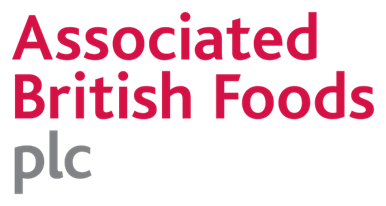
The company’s proactive management of costs and strategic focus on sustainability have resonated well with shareholders. ABF reported a 12% increase in adjusted operating profit in its grocery segment, supported by increased demand for everyday essentials. Additionally, the sugar division benefited from higher global prices, contributing to a 16% rise in operating profit to £482 million.
In light of these results, the company anticipates continued strong performance, particularly in its retail division, where Primark’s expansion into new markets and enhanced digital offerings are expected to drive growth.
ABF said it remains committed to delivering shareholder value and will pay a final dividend of 42.3 pence per share along with a special dividend of 27.0 pence per share.
BP’s results spark mild concern amid market volatility
BP’s (BP.) third-quarter results, reporting a net profit of $6.2 billion, elicited mild concern among investors as this figure fell short of expectations of approximately $7 billion.
The company’s overall revenue was $56 billion, up 6% year-on-year, but the lower-than-expected earnings highlighted the challenges posed by fluctuating oil prices and geopolitical tensions. Production levels were also impacted, with oil output dropping to 3.1 million barrels per day, reflecting ongoing adjustments in response to market conditions.
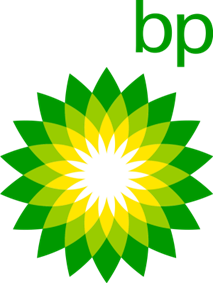
Despite these challenges, BP’s integrated gas segment reported a 25% increase in earnings, driven by high demand in Asian markets and higher liquefied natural gas (LNG) prices. The company’s focus on renewable energy continues to gain traction, with investments in low-carbon projects reaching $4 billion in the quarter. This diversification is critical as BP strives to balance its traditional operations with future energy transitions.
BP’s outlook remains cautious, with the company indicating that ongoing volatility in global energy markets and production adjustments could impact future earnings. The board expressed confidence in the long-term strategy but acknowledged the need for agility in the face of market uncertainties.
HSBC’s strong financials drive positive outlook
HSBC (HSBA) has reported robust third-quarter financial results, posting a profit before tax of $6.8 billion, which has generated a positive outlook among investors.
This marks a 14% increase from the same period last year, driven by a strong performance across its global banking and markets division, where revenue surged by 20% to $11 billion. The bank also reported a 25% increase in net interest income to $10 billion, primarily attributed to rising interest rates.

The bank’s cost-to-income ratio improved to 52.4%, down from 54.2% a year ago, reflecting ongoing efficiency efforts. HSBC’s wealth management business contributed significantly, with revenue increasing by 18% to $4.5 billion, bolstered by strong demand for investment products in Asia. This diversified revenue base has instilled confidence in stakeholders about the bank’s operational resilience.
HSBC’s guidance for the full year remains optimistic, with the bank targeting a return on equity of around 12%. The leadership indicated confidence in maintaining strong profitability, supported by a solid capital position and a focus on cost management.
Softcat: Impressive results fuel investor enthusiasm
Softcat (SCT) has reported impressive preliminary results for the year ended July 31, 2024, with revenue increasing by 20% to £1.2 billion, which has generated significant enthusiasm among investors.
Operating profit also saw a robust rise, reaching £120 million, up from £100 million the previous year. The company attributed this success to increased demand for IT services amid digital transformation trends across various sectors.
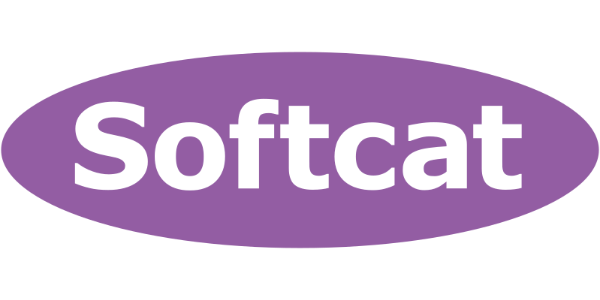
The company’s customer base expanded by 15%, with significant growth in both public and private sectors. Softcat’s strategic investments in cloud services and cybersecurity solutions have proven effective, leading to a 25% increase in these segments. Investors are encouraged by the company’s ability to adapt to market demands and capitalise on emerging opportunities.
In the update, Softcat highlighted its plans to continue investing in technology and talent, aiming for further growth in customer engagement. The positive sentiment surrounding the company underscores its potential for sustained success in the evolving IT landscape.
Smith & Nephew drop on disappointing update
Smith & Nephew’s (SN.) third-quarter trading update has resulted in a disappointing response, with revenue growth of just 1% year-on-year to $1.2 billion, falling short of market expectations.
The advanced wound management segment reported flat growth, while the orthopedic division experienced a 2% decline, reflecting challenges in a competitive healthcare market. Investors are expressing concern about the company’s ability to sustain growth amid these headwinds.
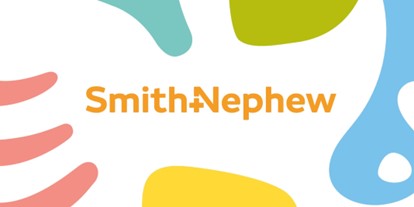
Despite ongoing efforts to innovate, including the launch of new products in orthopedics, the slow recovery post-pandemic has led to skepticism regarding Smith & Nephew’s future performance. Operating profit margins contracted to 15.2%, down from 17% a year ago, attributed to rising raw material costs and increased competition. The decline in sales for key products has intensified scrutiny over the company’s strategic direction.
Smith & Nephew emphasised its commitment to cost management and operational efficiencies in the update. However, without a clear and compelling growth strategy, investor confidence remains fragile as the company seeks to revitalise its performance in the coming quarters.
TP ICAP: Strong performance attracts positive attention
TP ICAP (TCAP) has delivered a strong trading update, reporting record group revenue of £557 million for the third quarter, reflecting a 10% year-on-year increase.
This robust performance was driven by a 14% rise in Global Broking revenue, attributed to favourable market conditions and volatility in interest rates. Liquidnet also showcased exceptional growth, with revenues soaring by 28%, supported by increased institutional activity in equity markets.
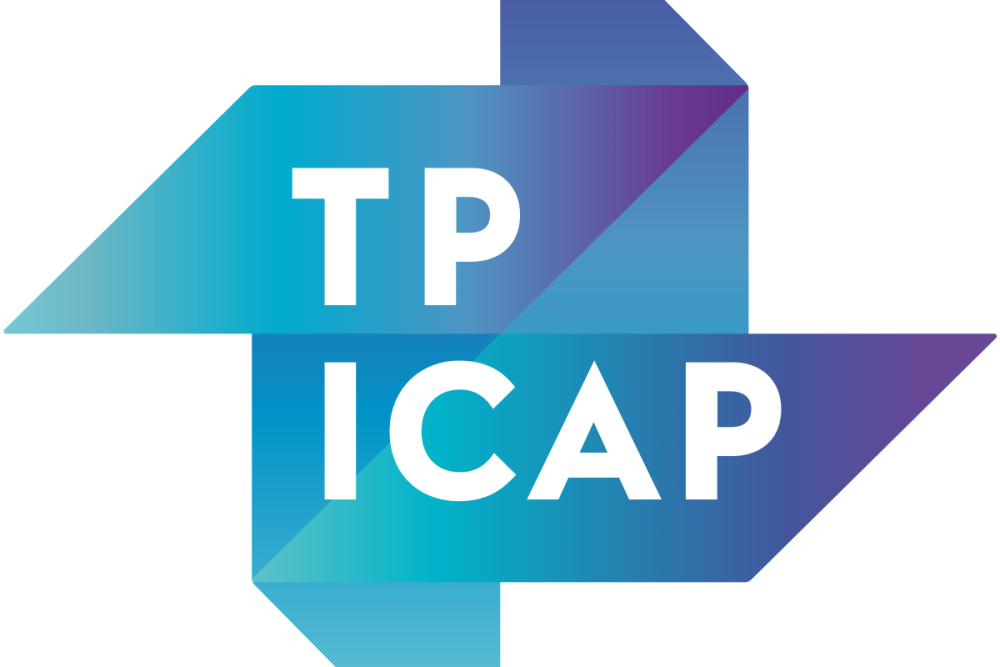
The company’s diversified business model proved effective, with Energy & Commodities (E&C) revenue rising by 3% and Parameta Solutions generating a 9% increase in revenue. The continued growth in multi-asset agency brokerage and OTC data services underscores TP ICAP’s strong market positioning, which has resonated well with investors looking for stability amid market fluctuations.
In its outlook, TP ICAP indicated that it is comfortable with market expectations for adjusted EBIT for FY 2024, though it acknowledged potential impacts from foreign exchange movements, particularly the strength of the US dollar against sterling. The ongoing focus on transformation and diversification is expected to enhance long-term growth prospects.
Trainline net ticket sales hit £3bn
Trainline’s (TRN) updated guidance for FY2025 has sparked optimism among investors, following strong H1 FY2025 results that highlighted a 14% year-on-year increase in net ticket sales to £3 billion.
Revenue for the half-year reached £229 million, reflecting a 17% increase, while adjusted EBITDA surged by 44% to £82 million. The operating free cash flow of £100 million indicates strong cash generation, further boosting investor sentiment.

The revised guidance now anticipates net ticket sales growth of between 12% and 14%, up from previous estimates that capped growth at 12%. Revenue growth expectations have also been raised to between 11% and 13%, indicating confidence in ongoing demand and operational efficiency. Trainline’s ability to leverage its digital platform effectively has positioned it well to capture increased travel activity.
The company’s focus on enhancing customer experience and expanding its market reach aligns with the positive trajectory reflected in these results. Trainline’s commitment to operational excellence bodes well for its continued performance in the competitive travel sector.
Disclaimer:
All content is provided for general information only and should not be construed as any form of advice or personal recommendation. The provision of this content is not regulated by the Financial Conduct Authority.

